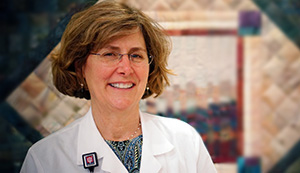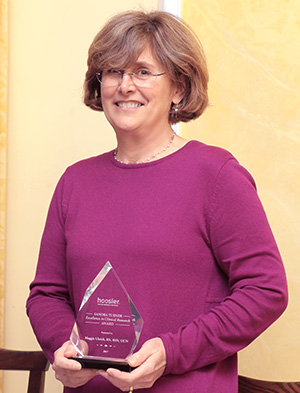Turner Award winner reflects on the gift of presence in oncology care

“Oncology is not for the faint of heart. It can be filled with a lot of joy, but there are really sad moments. You must have a way to manage those emotions, acknowledge them, and address them in a way that allows you to be there for a patient or a family. Though you have been an observer for a million times in this work, every time is their first time, and you have to pay attention to that.”
This perspective, shared by Maggie Uhrich, RN, BSN, OCN, during a recent interview, serves as a guiding principle in her work as a thoracic oncology nurse at Indiana University Melvin and Bren Simon Cancer Center.
At a recent event, Hoosier Cancer Research Network honored Uhrich with the 2017 Sandra Turner Excellence in Clinical Research Award. The award was established in 2002 by HCRN co-founder William B. Fisher, MD, through the George and Sarah Jane Fisher Fund to honor the memory of Sandra Turner, HCRN’s first executive director. The award is given to those who exemplify the qualities Turner possessed and respected in others, such as sustained professional commitment, contribution to the progress of oncology care, and the unflinching touch of compassion.
Uhrich is passionate about her work, but oncology was not always her plan. “I thought I was going to be an intensive care unit nurse,” she said. As is often the case with those who make a difference in others’ lives, a mentor made a difference in hers. While Uhrich was working toward her BSN degree at Georgetown University School of Nursing, her professor Vicki Mock, encouraged her to do a summer internship working with a hospice team at the Lombardi Cancer Center. “I did home visits, and I began to get curious about what happened to patients before they got to this point, and why were we not able to do something better or different for them,” Uhrich said.
Uhrich earned her BSN in 1986 amid a nationwide nursing shortage. In 1985, Jean Jenkins at the NIH Cancer Nursing Service had developed a Cancer Nurse Training Program to help recruit nursing staff, to address the growing need  for nurses trained to provide specialized oncology care and to provide nursing care for the growing number of patients entering drug trials for HIV and HIV-related cancers.
for nurses trained to provide specialized oncology care and to provide nursing care for the growing number of patients entering drug trials for HIV and HIV-related cancers.
During the Program from 1986 to 1987, Uhrich worked on one of the oncology units three days a week and took classes two days a week. “It was exciting, because the people who came to talk to us were, I later learned, the people who wrote the text book,” she said. “It was a pretty amazing place to be. Everybody treated at the NIH was on a clinical trial.”
After completing her training, Uhrich worked as a nurse on the inpatient unit then as a research nurse for the Medicine Branch, NCI at the NIH until 1990. After getting married, she moved to California, and started working at the University of California Davis Cancer Center. She gained broad experience in many areas of oncology: radiation oncology, surgical oncology bone marrow transplant, urology, and triage, as well as providing nursing support for a new Phase I Clinical Trial Consortium with USC Norris and City of Hope. In her role at UC Davis , she found a way to sustain her professional commitment through her eagerness to learn new and better ways of providing care for oncology patients.
Her triage experience kept Uhrich grounded in the raw human element of cancer care. “Every Friday from eight to five I would answer phone calls from patients; you get a sense of what patients are going through and the different problems that they have,” she said. “It was a great learning experience.”
While Uhrich grew in her professional experience, her commitment to caring for patients became painfully personal. “My mother-in-law, my sister, and my mom were all diagnosed with breast cancer within a couple months of each other,” Uhrich recalled. “I took time off to take care of my mom, and then an uncle who was diagnosed with stomach cancer.”
As a caregiver, Uhrich is committed not only to offering her patients the best treatment options available, but also to educating patients and keeping them engaged in the decision-making process. “I have worked really hard to make sure people understand what they are committing to,” Uhrich said. “I always tell them, ‘You are our priority, not the trial. I am here to make sure that we follow the trial and that we do things well, but you need to make sure that this is what fits you.”
To Uhrich, patient-centered care involves confronting barriers. When elements such as language, finances, culture, or even trust present obstacles, culturally sensitive communication can help pave the way for access to the services patients need.
There are practical barriers when you’re talking about people who speak other languages,” she said. “The ability to have real communication gets even more complex when you are trying to consent somebody for a trial and translating consents into their native language.”
Overcoming barriers of trust can be especially difficult. “It requires being culturally sensitive,” Uhrich said. “I have been struck by how often, when I talk with folks about clinical trials, people still have that idea that clinical trials are for guinea pigs, and that you are not being offered proven therapy. They want what is proven. Even now, the legacy of things like the Tuskegee Trials and story of Henrietta Lacks, are a real concern to many.”
To Uhrich, overcoming barriers is part of offering transformative care, but “to really make a difference for patients, we have to figure out how to either detect and treat their disease or prevent it in the first place,” she said. “That is part of the reason why I think clinical trials are so important, because the faster we can get the answers to the questions, the faster we can do things that we know really make a difference for patients.”
Uhrich’s commitment to meeting patients where they are is just one manifestation of her unflinching compassion, and it is not unlike how she meets each moment as it comes. “Life is full of ups and downs and requires a certain ability to be in the moment, experience what you are going to experience, and move beyond it. Acknowledge those feelings, do what you need to do about it, and then recognize it’s a beautiful day and the sun is shining. Every moment needs to be lived.”
The price of that approach – that practice of presence – is vulnerability, a price Uhrich willingly pays. “I remember I was meeting my husband, who was then my boyfriend, in New York. We were in the middle of Penn Station, and I just started these great heaving sobs about this guy — I still remember his name — who was over 80 years old, had come for a transplant, his platelets weren’t coming up, his family was in Texas, and he really needed to be home with his family. How could we make that happen?” Uhrich recalled. “The minute that you don’t feel sad at some point is the time you probably need to get out of doing oncology care.”
Uhrich counts her experiences – no matter how heart-wrenching – as gain. “In oncology, you have the opportunity to get to know people at some very critical times in their lives, she said. “Sharing that experience with people can be rewarding and you can learn so much. It is the gift of a new perspective, and it is part of what I like about my job.”
About Hoosier Cancer Research Network:
Hoosier Cancer Research Network (formerly known as Hoosier Oncology Group) conducts innovative cancer research in collaboration with academic and community physicians and scientists across the United States. The organization provides comprehensive clinical trial management and support, from conception through publication. Created in 1984 as a program of the Walther Cancer Institute, Hoosier Cancer Research Network became an independent nonprofit clinical research organization in 2007. Since its founding, Hoosier Cancer Research Network has conducted more than 180 trials in a variety of cancer types and supportive care, resulting in more than 350 publications. More than 7,500 subjects have participated in Hoosier Cancer Research Network clinical trials.

Facebook
Hoosier Cancer Research Network on Facebook
Linked In
You Tube
Twitter